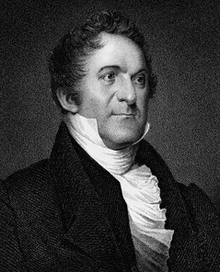William Wirt (Attorney General)
| William Wirt | |
|---|---|
 |
|
| 9th United States Attorney General | |
|
In office November 13, 1817 – March 4, 1829 |
|
| President |
James Monroe John Quincy Adams |
| Preceded by | Richard Rush |
| Succeeded by | John M. Berrien |
| Personal details | |
| Born | November 8, 1772 Bladensburg, Maryland |
| Died | February 18, 1834 (aged 61) Washington, D.C. |
| Political party | Democratic-Republican, Anti-Masonic |
| Spouse(s) | Mildred Gilmer (d. 1799) Elizabeth Washington Gamble (1784–1857) |
| Profession | Lawyer, Politician |
| Religion | Presbyterian |
| Signature | |
William Wirt (November 8, 1772 – February 18, 1834) was an American author and statesman who is credited with turning the position of United States Attorney General into one of influence. He was the longest serving Attorney General in U.S. history. Wirt County, West Virginia, is named in his honor.
William Wirt was born in Bladensburg, Maryland, to a German mother, Henrietta, and a Swiss father, Jacob Wirt. Both parents died before he was eight years old and Jasper Wirt, his uncle, became his guardian. Between his seventh and his eleventh year Wirt was sent to several classical schools and finally to one kept by the Rev. James Hunt in Montgomery County, where he received over the course of 4 years the chief part of his education. For two years he boarded with Hunt, in whose library he spent much of his time, reading with a keen and indiscriminate appetite. In his fifteenth year the school was disbanded, and his inheritance nearly exhausted.
Ninian Edwards (later governor of Illinois) had been Wirt's schoolmate, and Edwards' father, Benjamin Edwards (later a member of congress from Maryland), thought Wirt had more than ordinary natural ability and invited him to reside in his family as tutor to Ninian and two nephews, offering him also the use of his library for his own studies. Wirt accepted the offer and stayed twenty months, teaching, pursuing his own classical and historical studies, writing, and preparing for the bar.
Wirt was admitted to the Virginia bar in 1792, and he began practice at Culpeper Courthouse. Wirt had the advantages of a vigorous constitution and a good carriage, but the drawbacks of meager legal equipment, constitutional shyness, and brusque and indistinct speech. In 1795, he married Mildred, daughter of Dr. George Gilmer, and moved to Pen Park, where Gilmer lived, near Charlottesville. There he made the acquaintance of many persons of eminence, including Thomas Jefferson and James Monroe. For a time, Wirt took advantage of the hospitality of the country gentlemen and the convivial habits of the members of the bar so that he was regarded by other attorneys as a bon vivant, a fascinating, cheerful and lively, companion, rather than as an ambitious lawyer.
...
Wikipedia
